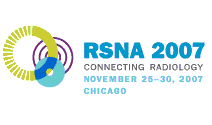
Abstract Archives of the RSNA, 2007
Raul Nirmal Uppot MD, Presenter: Nothing to Disclose
Colin Patrick Cantwell MD, Abstract Co-Author: Nothing to Disclose
Debra Ann Gervais MD, Abstract Co-Author: Speakers Bureau, Tyco Healthcare (Valleylab), Boulder, CO
Ronald Steven Arellano MD, Abstract Co-Author: Nothing to Disclose
Anthony Edward Samir MBBCh, Abstract Co-Author: Nothing to Disclose
Peter Raff Mueller MD, Abstract Co-Author: Nothing to Disclose
To review our experience with radiofrequency ablation of the adrenal gland - specifically assess the incidence of hypertensive crises, complications, and treatment outcomes.
Between 2003 and 2007, 6 radiofrequency ablations were performed in 5 patients (4 males, 1 females). Tumor type, equipment used, number of sessions, use of conscious sedation vs general anesthesia, incidence of treatment related hypertension, and complications was collected. In addition, follow-up CT's were reviewed to determine success at local control.
Average age of patients 63.60 (56-75). Tumors treated included metastatic renal cell cancers 66% (4/6), metastatic melanoma (1/6), and recurrent adrenal cell carcinoma (1/6). Majority of the treatments were done using general anesthesia (4/6). A hypertensive crisis was seen in 33% (2/6). In addition, one patient developed ventricular tachycardia, and a second patient developed atrial fibrillation. Recurrence rate was 40% (2/5) on follow-up imaging - one was re-treated with RFA and the second patient had other extensive areas of renal cell cancer metastasis including the brain precluding further RFA treatment. Interestingly, one patient was noted to have regression of pulmonary metastasis after RFA of metastatic renal cell carcinoma to the adrenal.
From our experience, our observations include: (1)The most common indication for treatment was metastatic renal cell cancer. (2) We observed a recurrence rate of 40% in the adrenal bed which may be related to the original tumors biology as other areas of metastasis are noted during follow-up imaging. (3) We observed one case regression of pulmonary metastasis after treatment of adrenal RCC and this may be related to a immunological response. (4) 33% had a hypertensive crisis. (5) Complications including ventricular tachycardia and atrial fibrillation may be related to a catecholamine release.
In the RFA of adrenal gland tumors, precautions for management of hypertensive crises and arrythmmias must be made. Both local recurrence and distant metastatic tumor burden regression can occur.
Uppot, R,
Cantwell, C,
Gervais, D,
Arellano, R,
Samir, A,
Mueller, P,
Adrenal Gland Radiofrequency Ablation: Observations from a Four Year Retrospective Review. Radiological Society of North America 2007 Scientific Assembly and Annual Meeting, November 25 - November 30, 2007 ,Chicago IL.
http://archive.rsna.org/2007/5007363.html

